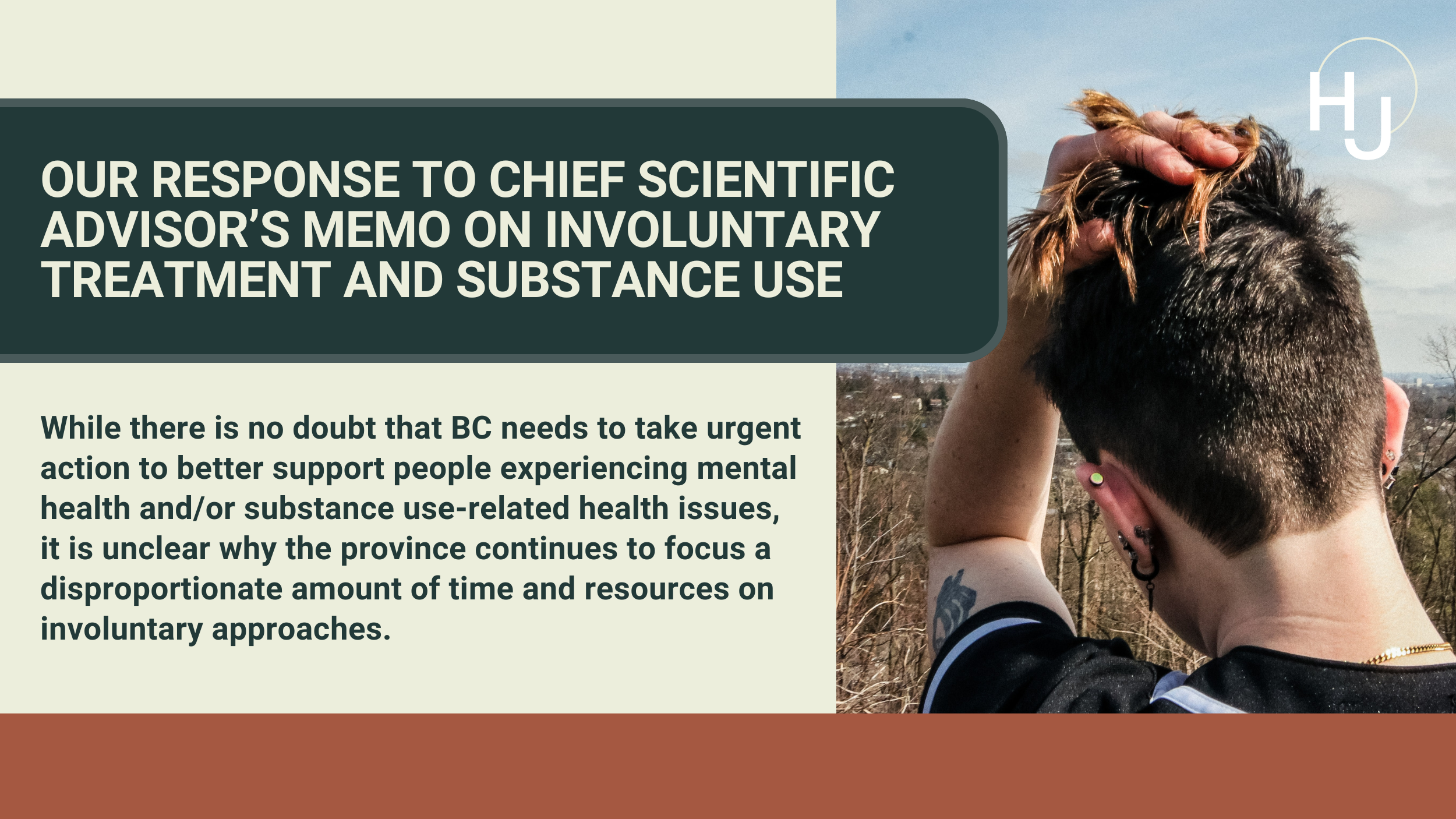Our Response to Chief Scientific Advisor’s memo on involuntary treatment and substance use
On March 12, 2025 the Office of the Chief Scientific Advisor for Psychiatry, Toxic Drugs, and Concurrent Disorders issued a guidance memo intended to improve health care for people who suffer from “overlapping mental-health and substance-use challenges, including brain injuries from toxic-drug poisonings.” The Chief Scientific Advisor for Psychiatry, Toxic Drugs, and Concurrent Disorders is an unelected position outside of the Ministry of Health, appointed by the Office of the Premier. It was created in June 2024 when Dr. Daniel Vigo, the current Chief Scientific Advisor, was appointed to the role.
What we know about the memo
The memo does not make any changes to the wording of the Mental Health Act. Its intended purpose is to “provide clinicians with clarifications for how the Act may be used to better support the care and treatment of this complex population, including involuntary treatments of individuals that require it.” In particular, the memo contains the Chief Scientific Advisor’s views on when and how involuntary treatment provisions already in the Act can be used on a person experiencing substance use-related health issues.
The memo is not binding on health care clinicians and leaves them to continue to rely on their own clinical judgment when making decisions related to involuntary treatment. The memo also does not come with any clinical guidance to support exercising this discretion.
Our concerns
While there is no doubt that BC needs to take urgent action to better support the needs of people experiencing mental health and/or substance use-related health issues, it is unclear why the province continues to focus a disproportionate amount of time and resources on involuntary approaches. In addition, we have a number of concerns about the memo and the process used to develop it.
Expansion of the use of involuntary treatment without adequate safeguards. While the memo does not make any changes to the wording of the Act, it offers a new interpretation of the law suggesting that the Act authorizes involuntary treatment in situations where it has not been consistently used in the past. In Health Justice’s view, this is an expansion of the legal powers historically understood to be authorized by the Mental Health Act. This expansion is concerning in the face of the numerous inadequacies already identified with existing safeguards in the Act, which remain unaddressed (5 buckets of Oversight and Accountability, Committed to Change: Protecting the Rights of Involuntary Patients under the Mental Health Act, Detained: Rights of children and youth under the Mental Health Act, Strengthening Access to Justice).
Lack of stakeholder engagement to benefit from crucial expertise. The news release accompanying the Chief Scientific Advisor’s memo notes that he is mandated to work with “stakeholders, partners and clinicians” to improve supports for people with concurrent mental health and substance use health issues. Health Justice was not involved in and was not invited to any engagement related to the development of the memo despite being a recognized stakeholder with unique and deep expertise related to involuntary treatment in BC.
In particular, our staff team have now spent hundreds if not thousands of hours with people who have experienced involuntary treatment to learn what could improve their experience and wellbeing. We also have a law and policy team who hold unique expertise on mental health legislation in the province, across Canada, and globally. The memo does not appear to include any expertise shared by people with lived and living expertise or community legal experts.
Next steps
Over the coming weeks, we will continue to engage with our community of people with lived and living experience to understand and reflect their views. We will also continue to analyze the memo to understand its legal and practical implications. The expanded interpretation of the Act set out in the memo also demonstrates the need for stronger safeguards and presents an opportunity to take action through increased accountability and oversight of the powers authorized by the Mental Health Act.
Finally, we will continue our advocacy to ensure that the expertise of people with lived and living experience and the community organizations that work with them have a voice in shaping the mental health and substance use system in BC.

